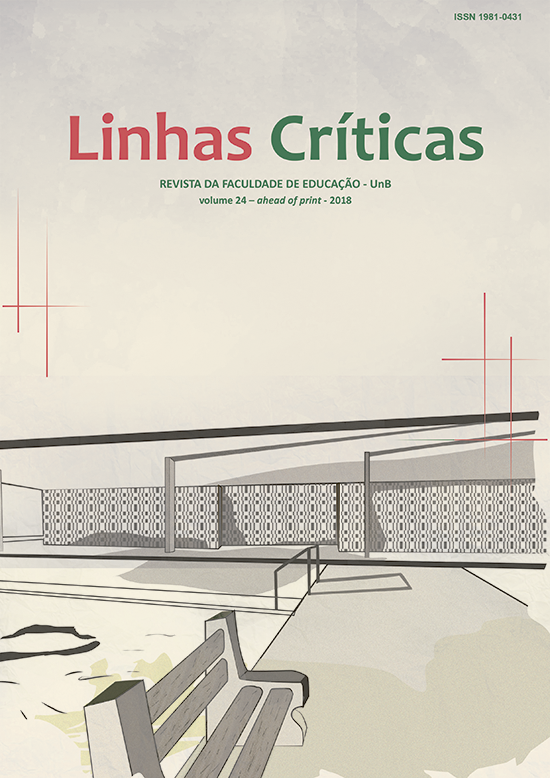Narrative experiences
an account of health education
DOI:
https://doi.org/10.26512/lc.v24i0.18978Keywords:
Narratives, Health, EducationAbstract
We present a discussion based on the module "Meetings and Production of Narratives", an integral part of the curricular matrix of a university education in health. The study is based on reports about the practical dimension experienced by students, which includes listening to users linked to Health Units, with attention to health. During a semester, pairs of students conduct biweekly home visits to users, producing field diaries that will be the basis for the construction of a narrative. The process situates the narrative as a potent pedagogical resource for the awareness of oneself, the other and the concrete conditions of existence.
Downloads
References
Azevedo, A. B. de, Pezzato, L.M., & Mendes, R. (2017). Formação interdisciplinar em saúde e práticas coletivas. Saúde em Debate, 41(113), 647-657.
Benjamim W. (1987). Rua de mão única. Tradução Rubens Rodrigues Torres Filho. São Paulo: Brasiliense.
Brasil. (2017). Ministério da Saúde. Saúde abre consulta pública para qualificar atendimento a idosos. Recuperado em 21/11/2017, de http://www.brasil.gov.br/saude/2017/11/saude-abre-consulta-publica-para-qualificar-atendimento-aidosos
Bondía, J. L. (2002). Notas sobre a experiência e o saber de experiência. Revista Brasileira de Educação, (19), 20-28.
Bosi, E. (1994). Memória e Sociedade: Lembranças de Velhos. São Paulo: Companhia das Letras.
Brum, E. (2006). A vida que ninguém vê. Porto Alegre: Arquipélago Editorial.
Capozzolo, A. A.; Casetto, S. J.; Henz, A. O. (Org.) (2013. Clínica comum: itinerários de uma formação em saúde. (pp. 163-186). São Paulo: Hucitec.
Capozzolo, A.A., Casetto, S.J., Imbrizi, J.M., Henz, A.O, Kinoshita, R.T., & Queiroz, M.F.F. (2014). Narrativas na formação comum de profissionais de saúde. Trabalho, Educação e Saúde, 12(2), 443-456.
Coelho, M.E.M., & Ferreira, A.C. (2015). Cuidados paliativos: narrativas do sofrimento na escuta do outro. Revista Bioética, 23(2), 340-348.
Cunha, M.I. (1997). Conta-Me Agora! As Narrativas Como Alternativas Pedagógicas Na Pesquisa E No Ensino. Revista da Faculdade de Educação, 23(1-2)
Czeresnia, D. (2003). O Conceito De Saúde E A Diferença Entre Prevenção e Promoção In: Czeresnia D., Freitas. C. M. (Org.). Promoção da Saúde: conceitos, reflexões, tendências. (pp.39-53). Rio de Janeiro: Ed. Fiocruz.
Favoreto, C. A. O. & Camargo Jr, K. R. de. (2011). A narrativa como ferramenta para o desenvolvimento da prática clínica. Interface - Comunicação, Saúde, Educação, 15 (37), 473-483.
Ferreira, O. G. L., Maciel, S.C., Silva, A.O., Sá, R. C. N. & Moreira, M.A.S. P. (2010). Significados atribuídos ao envelhecimento: idoso, velho e idoso ativo. PsicoUSF, 15(3), 357-364.
Fonseca, M. J. M. (2014). Introdução à Hermenêutica de Paul Ricoeur. Recuperado em 10/08/2017 de http://www.ipv.pt/millenium/Millenium36/3.pdf
Henz, A.; Casetto, S. (2003). Orientações para o trabalho de campo. In: Capozzolo, A. et al.. (Orgs). (pp. 277-289). São Paulo: Hucitec.
Hess, R.. (2006). Momento do diário e diário dos momentos. In: Souza, E. C & Abrahão, M.H.B. (Orgs.). Tempos, narrativas e ficções: a invenção de si. (pp. 89-104). Porto Alegre: Editora PUCRS.
Melo, M. L. A. (2016). Contribuições da hermenêutica de Paul Ricoeur à pesquisa fenomenológica em psicologia. Psicologia USP, 27(2), 296-306.
Novoa, A. (2014). Não há conhecimento como conhecimento de nós mesmos. In: Vicentinni, A. F. & Evangelista, F. (Org). Um baú de histórias: narrativas em formação. (pp 9-11), Campinas: Mercado de letras.
Ricoeur, P. (2012). Entre tempo e narrativa: concordância/discordância. Kriterion: Revista de Filosofia, 53(125), 299-310.
Campos, R. T.& Furtado, J. P. (2008). Narrativas: utilização na pesquisa qualitativa em saúde. Revista de Saúde Pública, 42(6), 1090-1096.
Silva, L. B. de O. (2011) A interpretação hermenêutica em Paul Ricoeur: uma possível contribuição para a educação, Comunicações, 18 (2), 19-36.
Veras, R. P. (2012). Prevenção de doenças em idosos: os equívocos dos atuais modelos. Cadernos de Saúde Pública, 28(10), 1834-1840.
Published
How to Cite
Issue
Section
License
Copyright (c) 2018 Revista Linhas Críticas

This work is licensed under a Creative Commons Attribution 4.0 International License.
Authors who publish in this journal agree to the following terms:
-Authors maintains the copyright and grants the journal the right of first publication, the work being simultaneously licensed under the Creative Commons Attribution License which allows the sharing of the work with recognition of the authorship of the work and initial publication in this journal.
- Authors are authorized to enter into additional contracts separately, for non-exclusive distribution of the version of the work published in this journal (eg publish in institutional repository or as a book chapter), with acknowledgment of authorship and initial publication in this journal.
-Authorers are allowed and encouraged to publish and distribute their work online (eg in institutional repositories or on their personal page) at any point before or during the editorial process, as this can generate productive changes as well as increase the impact and the citation of published work (See The Effect of Free Access).



